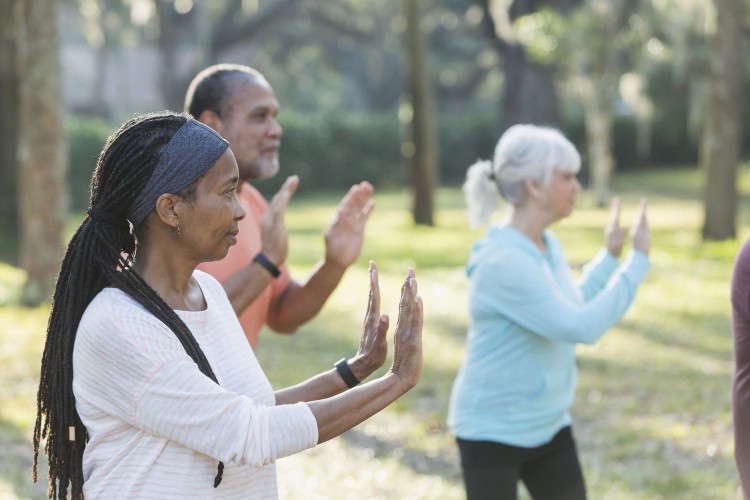Tai Chi May Help Improve Memory, Slow Progression of Parkinson's Disease
- Two new studies found that tai chi may be beneficial in protecting memory for seniors with mild cognitive impairment, and in slowing symptom progression for those with Parkinson's disease.
- The practice has a wide range of benefits for both the brain and the body, experts agreed.
- It's not yet clear if it could completely prevent cognitive issues, but tai chi is a great way for people to stay healthy as they age, experts said.
The ancient exercise of tai chi has long been associated with better balance, stability, and mood—but two new studies show the practice may also provide major brain health benefits to older adults.
The first study, published in the Annals of Internal Medicine, found that practicing tai chi may help improve cognition and memory concerns in people with mild cognitive impairment; the second, in the Journal of Neurology, Neurosurgery, and Psychiatry, showed that doing the exercise for an extended period of time could help slow the progression of Parkinson's disease.
According to experts, it’s no surprise that the slow, controlled movements of tai chi—a workout for the body and mind—can benefit both physical and cognitive health.
“By nature of the fact that it is movement during this choreographed sequence, you have to make a connection between what you’re seeing an instructor do, and what you want your body to do,” said Kerri Winters-Stone, PhD, study coauthor and professor at the Knight Cancer Institute at Oregon Health and Science University.
“[It’s] a real cognitive challenge,” Winters-Stone told Health. “[It’s] a nice type of intervention for improving cognitive health and improving brain health.”
Here’s what experts had to say about the benefits and limitations of tai chi, how the practice affects the body, and who should consider adding tai chi to their wellness routine.

kali9/Getty Images
What Does the New Research Say About Tai Chi?
Tai chi has been around for centuries and originated as a martial art in China. Currently, in the U.S., the practice is largely used to promote health or rehabilitation, but research continues to prove the practice’s other benefits.
Previously, tai chi has been shown to help people with osteoarthritis manage chronic pain, improve range of motion in people with rheumatoid arthritis, and promote the quality of life and mood in patients with heart failure and cancer.
For the first of the new studies, which focused on mild cognitive impairment and memory loss, researchers divided 304 older adults into three groups: one practiced stretching, another did tai ji quan (tai chi), and a third did “cognitively enhanced” tai ji quan, which incorporated memory and multitasking exercises with traditional tai chi.
To test cognition, Winters-Stone and the other researchers used a test called the Montreal Cognitive Assessment (MoCA), as well as dual-task walking, which assesses “how well people can do a physical and mental task at the same time,” Winters-Stone said.
After 24 weeks, the cognitively-enhanced tai chi group improved their MoCA scores by 1.5 points compared to the traditional tai chi group, and by 2.8 points compared to the stretching group. In dual-task walking, the cognitively-enhanced group outperformed the traditional tai chi group by about 10% and the stretching group by 22%.
Meanwhile, the study that looks at tai chi's effect on Parkinson's disease found that practicing the exercise over the span of 3.5 years was associated with benefits for adults with the disease, including a delayed need for anti-parkinsonian drugs and a slower progression of motor issues associated with the disease. Those participants who practiced tai chi were also more likely to see improvement in their non-motor symptoms, like mood, sleep, and quality of life.
Heart-Healthy DASH Diet May Help Women Avoid Memory Loss Later in Life
Why Does Movement Have Such a Substantial Effect on Health in Old Age?
Like many other forms of exercise, tai chi can increase blood flow, reduce some stress hormones and inflammatory biomarkers, and more. All of these things can help keep the brain functioning properly, though they’re “generalizable to any type of physical activity,” said Winters-Stone.
But tai chi has its own set of unique benefits, as well.
“[The movements] can enhance postural stability and balance control, and walking efficiency,” Winters-Stone said.
This is because the movements require people to “move outside of their center of gravity,” as well as engage in “squatting movements” that are similar to getting out of bed or a chair, she added.
Additionally, unlike other forms of low-impact exercise such as walking, tai chi is a mental workout, too.
“There’s already some cognitive challenge with tai ji quan because it’s a choreographed type of exercise,” Winters-Stone said. “People have to be able to follow and reproduce those movements in a sequence.”
Most Older Adults Don't Know You Can Test for Alzheimer's Disease
Should You Start Doing Tai Chi?
In addition to its range of health benefits, tai chi is also fairly accessible—the practice is usually done in class settings and no additional equipment is required.
There are five different styles—Chen, Yang, Wu, Sun, and Hao—all of which have slightly different movements and cater to different groups or abilities.
To get started Subramanian recommends “just dropping in and trying it."
For people with more advanced Parkinson’s or other cognitive issues, there may be an added risk of falls or other issues, Subramanian added. These people may want to consult with a doctor or physical therapist before starting a tai chi class, she said, but in general, the practice should be safe as long as people start slow.
There are usually local community classes held at schools, recreational centers, or senior centers, Subramanian said. People can also ask around at Parkinson’s or memory support groups to see if these groups have any information on local tai chi classes, she added.
However, the practice can also be done virtually—people can find tai chi videos online or can join tai chi Zoom classes for example, Winters-Stone said.
“Supervised exercise tends to result in better outcomes than unsupervised exercise,” Winters-Stone said. From personalized coaching from a trainer to accountability from the peers in the group, that may make it easier to stick with tai chi.
As for when people should try tai chi, one might assume that starting it in middle age could protect against Parkinson’s symptoms or mild cognitive decline later in life. However, it may be too early to draw that conclusion, Subramanian explained.
“To say that this is protecting the brain from the progression of [Parkinson’s] would probably be a bit of an overstatement. That is the Holy Grail in most disease states,” she said. “It modifies the disease in a positive way, so I think we can encourage people from diagnosis to pick some of these approaches.”
That being said, Subramanian said starting tai chi before someone reaches old age is likely going to be helpful, and might even “lay the foundation for you to do well as you age.”
“We have to think about the long-term benefits of exercise,” Winters-Stone said. “People get discouraged because they don’t see weight loss or other changes early on. But those things are happening, and they’re also preventing much more difficult things later on.”
Hobbies Like Gardening, Fishing Can Boost Your Brain Health










